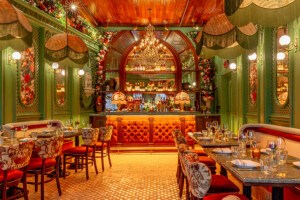Tree House Moves Into Its ‘Dream Brewery’

Photo by Nate Lanier
Back in January, when Row 34 beer director Megan Parker-Gray announced plans to host a five-course beer dinner with the most beloved dark horse brewery in Western Massachusetts—Tree House in Monson—the news caused more hubbub than Jay Z coming to Fenway. The $100 tickets went live, unannounced, at 1 p.m., with beer geeks scrambling to get on Eventbrite in time to experience Tree House’s Haze double IPA paired with chef Jeremy Sewall’s seafood suquet and the coveted Good Morning maple imperial stout relished alongside Row 34’s chicory creme caramel. The tickets vanished in less than two minutes. But for anyone familiar with Tree House’s growing reputation, that wasn’t a surprise.
Founded by Nate Lanier, Damien Goudreau, Jonathan Weisbach, and Dean Rohan in Brimfield in 2012, the operation has grown from a little-known nano-brewery cranking out 10-gallon batches at a time, to one of the most revered craft producers in all of beer-crazy New England. But after several moves, one prompted by a messy zoning dispute in Brimfield, Lanier says they’ve finally found their ideal home.
“We started in Brimfield and the original plan was to move into the brewery we are now, our ‘dream brewery,'” Lanier says. “But the town over there, we had some run-ins with a couple of neighbors who didn’t understand what we were doing, so we had to move in a hurry, to a temporary spot. We operated out of there for over a year and worked under some pretty crushing demand. It’s been the brewery equivalent of living paycheck-to-paycheck. We couldn’t keep up.”
Over the weekend, Tree House transferred the rest of their equipment across the street to a new 9,000 square foot facility that will allow the brewery to produce 10 times their previous annual output. Located only 150-yards from their last spot, yet still within the confines of Koran Farms’ 220 acres of active farmland, Tree House’s new brewery features a canning line, a mixed fermentation barrel program, and a 30-barrel brewhouse capable of producing 7,000 barrels of beer a year.
For those attached to Tree House’s cozy former digs, with its pinewood siding, outdoor seating, and roaring fire pits in the winter, the transition will appear seamless. The new 1,000 square foot taproom is modeled after its last retail space, with pine and reclaimed wood harvested from 50-year-old hay trailers on the property. The one major difference being the vicinity of the of the actual brewing process, that enticing bouquet of boiling malt, and of course, all those hops. “The shop is really cool because, besides the roof above your head, you’re inside the brewery,” Lanier says. “I’ll be making beer 30 feet away from where people are drinking and buying cases of beer.”

Tree House’s new canning line. Photo by Nate Lanier
The phrase “farmhouse brewery” is used fairly liberally these days, but Tree House is actually located on a 100-year-old, continuously productive farm, and the brewers are going to be taking advantage of that fact, with numerous areas set aside for their own hops crops and fruit trees yielding produce for a small-batch fruited berliner weisse, not to mention other sour projects. Inside, its 12 taps will be primarily dedicated to limited-run beers, now being produced on its old five-barrel pilot system. These will include special dry-hopped editions of their Julius IPA, coffee and vanilla bean editions of their various stouts, and regular imperial versions of their beers, such as the highly coveted King Julius and Very Green.
Regarding its everyday lineup of beers, Tree House will mostly be relegating those to can sales in order to expedite the notoriously lengthy growler-filling process. As Lanier says, “The whole goal of this brewery is to be hyper-efficient and to have beer easily accessible and available, especially in canned form. People have been marvelously patient with us up until now. In general, there’s kind of a notion that no one is making enough beer, but our hope it to make enough to satisfy a respectable demand close to home.”
Tree House’s debut canned offering came out last weekend, a super juicy pale ale dubbed Lights Out, which Lanier has called its “guinea pig beer.” The brewery admits they’re still working out the kinks when it comes to their new aluminum-focus, but when they start to feel more comfortable with the system (presumably in the next few weeks), they’ll start to package Green, Julius, Haze, and some of their other known entities, in 16-ounce four packs.
Currently, Tree House is maintaining its regular business hours from Thursday through Saturday, but by the end of month they expect to expand their retail hours to include Tuesday and Wednesday as well. Even with the increased production, Lanier says the brewery’s goal is to limit distribution to Western Massachusetts, but he’s hopeful they’ll have enough to parse out kegs to some of his favorite beer bars around Boston.

Photo by Nate Lanier
160 E Hill Road, Monson; 413-523-2367 or treehousebrew.com.


